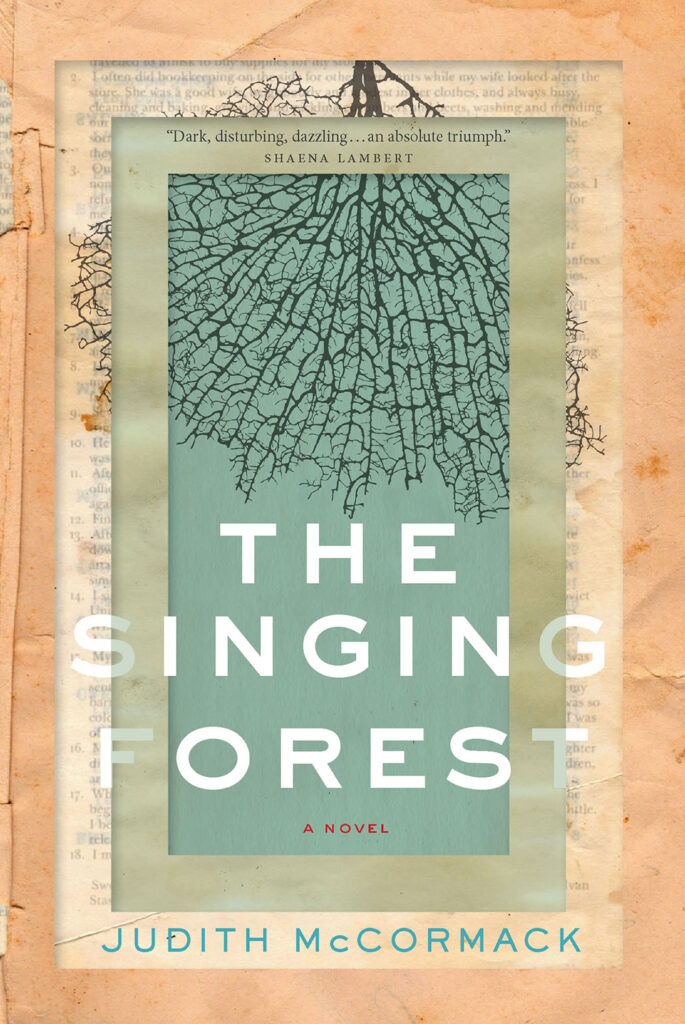
Happy book birthday to THE SINGING FOREST by Judith McCormack, out today from Biblioasis! In attempting to bring a suspected war criminal to justice, a lawyer wrestles with power, accountability, and her Jewish identity.
“A brilliant stroke … McCormack’s scope is impressive. The Singing Forest is a crime drama, an historical novel, and a character-driven work … This novel posits that time does not heal all wounds. Recognition, reparation, and remembrance are urgent.”—Quill & Quire
“The Kurapaty mass grave near Minsk, Belarus, was used to hide the bodies of thousands murdered by Stalin’s secret police from 1937 to 1941 … searingly, as McCormack writes, there are the voices of the dead who cry out, ‘We are here. We are waiting.’ Know this history through your heart, through the empathetic imagination of McCormack’s fiction.”—Kim Echlin, author of The Disappeared
“In this hypnotically layered novel, a young Jewish lawyer, Leah Jarvis, is assigned the case of Stefan Drozd, a nonagenarian war criminal facing deportation for acts he committed as a minor in Belarus. McCormack treats her characters with unnerving fairness, balancing terror with beauty, a brutal childhood with an odd and loving one, and somehow squeezing out of the reader sympathy for Drozd—until horror precludes it. Deeply intelligent and deeply moral, The Singing Forest shows that, like glass, truth is amorphous. It also makes the case that, though ‘there is no general duty to rescue’ in law, a family might save a child, as it did Leah. Or it may, like Drozd, make a monster of him.”—Caroline Adderson, author of A History of Forgetting and A Russian Sister
“Sometimes, as a reader, you put down a book in wonder, because you have been inside the mind of a deep and seeing writer, whose vision of the world is captivating, original and illuminating. Such a writer is Judith McCormack. In vibrant and nuanced language McCormack spirals us into the heart of a war criminal, and the brilliant lawyer who unravels the workings of his mind. Dark, disturbing, dazzling—this is an unflinching look at evil—and yet, and here is McCormack’s genius, we emerge more whole. The Singing Forest is an absolute triumph!”—Shaena Lambert, author of Petra and Oh, My Darling/
In a quiet forest in Belarus, two boys make a gruesome find that reveals a long-kept secret: the mass grave where Stalin’s police buried thousands of murder victims in the 1930s. The results of the subsequent investigation—30,000 dead—has far-reaching effects, and across the Atlantic in Toronto, young lawyer Leah Jarvis finds herself tasked with an impossible case: the trial of elderly Stefan Drozd, a former member of Stalin’s forces, who fled his crimes in Kurapaty for a new identity in Canada. Though Leah is convinced of Drozd’s guilt, she needs hard facts. Determined to bring him to justice, she travels to Belarus in search of witnesses—and finds herself piecing together evidence of her own past: her mother’s death, her father’s absence, the shadows of her Jewish heritage. Lyrical and wrenching by turns, The Singing Forest is a profound investigation of memory, truth, and the stories that tell us who we are.
Judith McCormack was born in Evanston, and grew up in Toronto, with several years in Montreal and Vancouver. She is Jewish through her mother, and her maternal grandparents came from Belarus and Lithuania, with her father contributing his Scots-Irish heritage. Her writing has been shortlisted for the Writers’ Trust Fiction Prize, the Commonwealth Writers’ Fiction Prize, the Journey Prize, and the Amazon First Novel Award, and her short stories have appeared in the Harvard Review, Descant, The Fiddlehead, Coming Attractions, and Best Canadian Stories. She also has several law degrees, which first introduced her to story-telling, and is a recipient of the Law Society Medal and The Guthrie Award for access to justice. Judith is represented by Marilyn Biderman.
Share:
